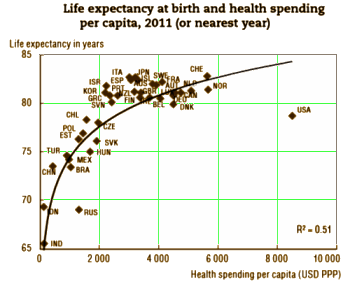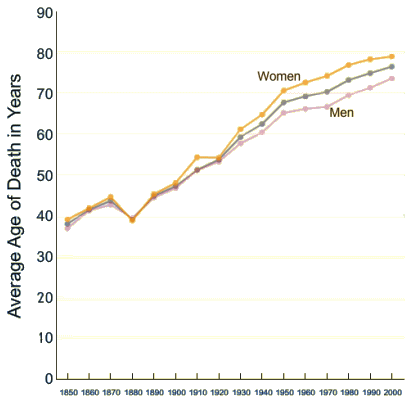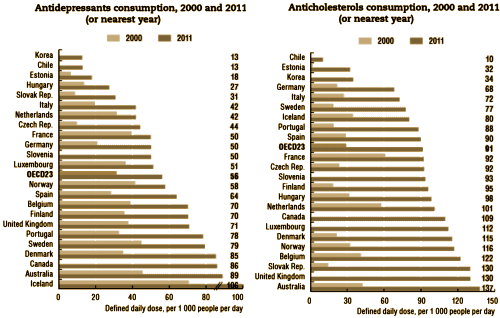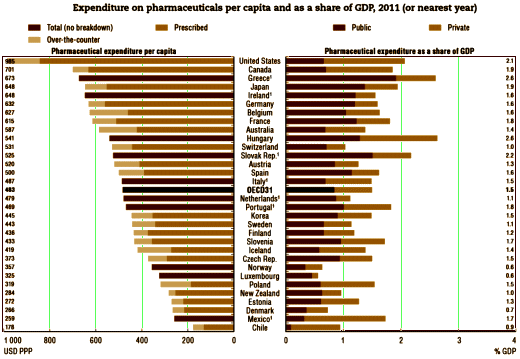Growth in health spending has slowed markedly in almost all OECD countries since 2008. After years of continuous growth of over 4% per annum, average health spending across the OECD grew at only 0.2% between 2009 and 2011. Total health spending fell in 11 out of the 34 OECD countries between 2009 and 2011, compared to pre-crisis levels. Not surprisingly, the countries hit hardest by the economic crisis have witnessed the biggest cuts in health expenditure growth. For example, Greece and Ireland experienced the sharpest declines, with per capita health care spending falling by 11.1% and 6.6%, respectively, between 2009 and 2011. Health spending growth also slowed significantly in Canada and the United States. Only in Israel and Japan has health spending growth accelerated since 2009…


As transparency increases and blockbuster drugs lose patent protection, drug companies have dramatically scaled back payments to doctors for promotional talks. This fall, all drug and medical device companies will be required to report payments to doctors.ProPublicaby Charles Ornstein, Eric Sagara, and Ryann Grochowski JonesMarch 3, 2014Some of the nation’s largest pharmaceutical companies have slashed payments to health professionals for promotional speeches amid heightened public scrutiny of such spending, a new ProPublica analysis shows. Eli Lilly and Co.’s payments to speakers dropped by 55 percent, from $47.9 million in 2011 to $21.6 million in 2012. Pfizer’s speaking payments fell 62 percent over the same period, from nearly $22 million to $8.3 million. And Novartis, the largest U.S. drug maker as measured by 2012 sales, spent 40 percent less on speakers that year than it did between October 2010 and September 2011, reducing payments from $24.8 million to $14.8 million.
The sharp declines coincide with increased attention from regulators, academic institutions and the public to pharmaceutical company marketing practices. A number of companies have settled federal whistleblower lawsuits in recent years that accused them of improperly marketing their drugs. In addition, the Physician Payment Sunshine Act, a part of the 2010 health reform law, will soon require all pharmaceutical and medical device companies to publicly report payments to physicians. The first disclosures required under the act are expected in September and will cover the period of August to December 2013.
Within the industry, some companies are reevaluating the role of physician speakers in their marketing repertoire. GlaxoSmithKline announced in December that it would stop paying doctors to speak on behalf of its drugs. Its speaking tab plummeted from $24 million in 2011 to $9.3 million in 2012. Not all companies have cut speaker payments: Johnson and Johnson increased such spending by 17 percent from 2011 to 2012; AstraZeneca’s payments stayed about flat in 2012 after a steep decline the previous year…


I am sure this nice sounding letter was bought and paid for by your friends at pharma. After all, who could make something sound so innocent, but just gut the whole statute.
Steve Lucas
“Many medical textbooks & scientific medical journal supplements
and reprints are used in this way by physicians. The design of the reporting requirement presents a clear
disincentive for clinicians to accept high quality, independent educational materials; an outcome that was
unintended when the provision was passed into law. ”
what liars. wow.
Mickey,
I agree with your ‘license revocation’ solution. Doctors spend lots of time getting educated, and then take an oath. I do not believe they can truly serve two masters (patients and BigPharma). To believe that they can, shows a certain willful blindness. If they want to pimp for the pharmaceutical companies, to preach to the choir of their peers as KOLs, then let their remuneration come solely from their masters.
The great sociologist Jane Jacobs nailed it regarding that letter with this passage:
“There are many fine points to medical ethics, and some difficult puzzles, but the most rudimentary morality is the line between the guardian and commercial (traditions). It’s as crucial that physicians understand it as it is that lawyers recognize that when they go into guardian service they can’t morally also be in service to clients seeking to influence legislation or regulatory decisions.” [Systems of Survival, Random House 1992]